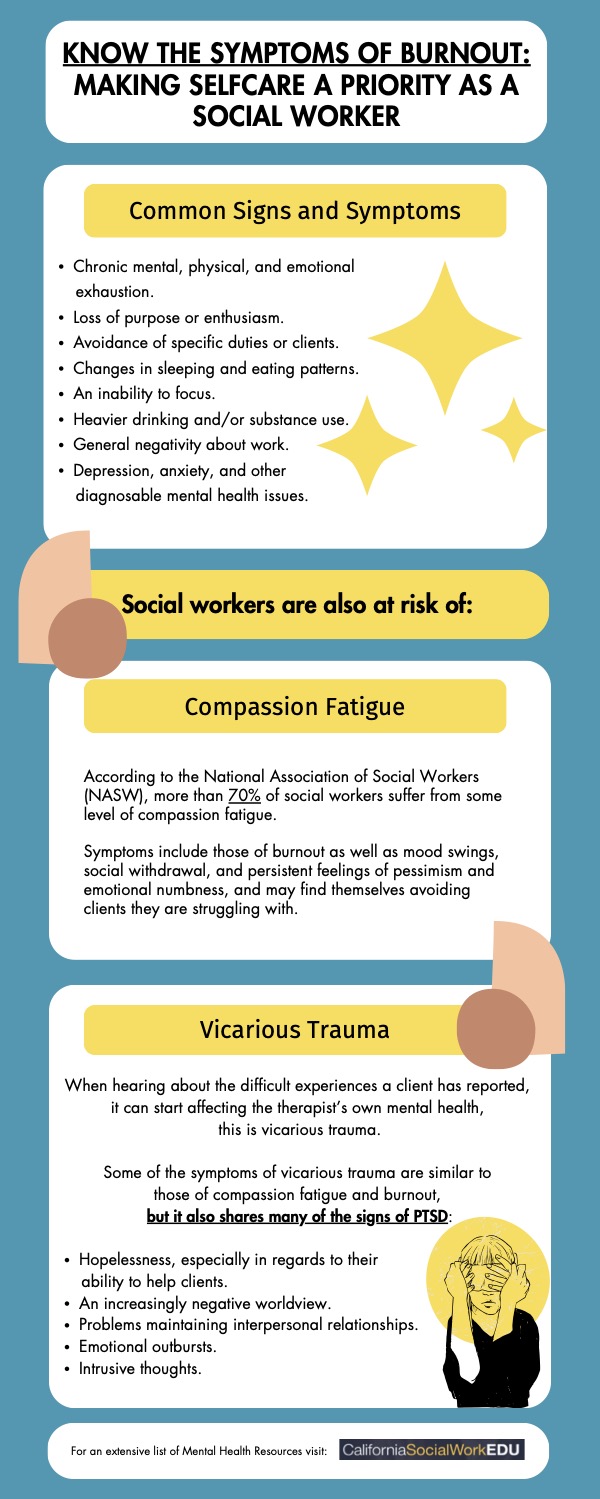Written by Sam Medley

It’s Wednesday morning. You’ve been with your agency for about a year now and as you settle in at your desk, you feel confident. The support group you ran last night went perfect. People showed up with the weight of the world on their shoulders but left knowing they weren’t alone. You’re proud of not only the work you’ve done, but of how far your clients have come.
But in a way you can’t quite describe, you feel unsettled. No matter how hard you work, your caseload seems to swell by the day. Today, you’re supposed to follow-up with some new clients and you know what that means — more work to get behind on, more spinning your wheels, and more chances to fail.
You check the clock on your phone. Only eight hours to go if you’re lucky. You feel ashamed of the dull sense of dread that fills you, but when you realize you felt this way yesterday and Monday and the Friday before, you feel even worse.
In an emotionally taxing career like social work, these feelings aren’t uncommon. But more importantly, they don’t have to be permanent. And like your clients, you’re not alone in facing them.
A survey of over 6,000 social workers found that about 52% of professionals experience mental health problems at some point during their career. In light of that statistic, the ability to recognize and overcome these struggles is just as important to a social worker’s skill set as anything else.
Signs of Burnout and Common Mental Health Issues Amongst Social Workers
Social workers are steeped in emotional intelligence. As they connect clients to life-saving resources, they also make them feel heard, validated, and confident. But turning this talent inward isn’t always so easy, especially if you feel emotionally drained by your job.
The first step in becoming your own mental health advocate is recognizing the symptoms of burnout and work-related mental stress:
- Chronic mental, physical, and emotional exhaustion.
- Loss of purpose or enthusiasm.
- Avoidance of specific duties or clients.
- Changes in sleeping and eating patterns.
- An inability to focus.
- Heavier drinking and/or substance use.
- General negativity about work.
- Depression, anxiety, and other diagnosable mental health issues.
These symptoms can plague any type of worker, but social workers have two more psychological symptoms to look out for: compassion fatigue and vicarious trauma.
Compassion Fatigue
Compassion, like a muscle or a pencil, can wear down over time. For counselors, social workers, and other professionals who help people through difficult situations, it can become a chronic condition called compassion fatigue.

The symptoms of compassion fatigue are similar to those of burnout. Some of the added psychological signs of it include mood swings, social withdrawal, and persistent feelings of pessimism and emotional numbness. However, compassion fatigue can also have physical symptoms like chronic fatigue. Social workers who experience it are likely to avoid clients they’re struggling with.
According to the National Association of Social Workers (NASW), more than 70% of social workers suffer from some level of compassion fatigue. Those with heavy caseloads or who deal with particularly complex cases are especially at risk.
Vicarious Trauma
Some social workers help clients navigate abusive, violent, and exploitative situations. When hearing about these experiences starts affecting one’s mental health, it’s called vicarious trauma.
Some of the symptoms of vicarious trauma are similar to those of compassion fatigue and burnout, but it also shares many of the signs of PTSD:
- Hopelessness, especially in regards to their ability to help clients.
- An increasingly negative worldview.
- Problems maintaining interpersonal relationships.
- Emotional outbursts.
- Intrusive thoughts.
While vicarious trauma is common amongst social workers, it’s also prevalent amongst first responders, legal professionals, and other victim services professionals.
Mental Health Resources For Social Workers in California
Athletes train and condition. Construction workers wear hard hats. Social workers maintain their mental health. While that looks different for each person, the following guide provides a wealth of information, self-care techniques, and counseling resources for social workers in California.
Seeds of Hope: Small Victories Make Systemic Change Possible
Everyone has bad days. Because social workers are so driven to help their clients, bad days can seem more personal or even catastrophic. During these times, remember that you are a vital part of something much bigger — and there’s plenty of data to back that up.
Because of the efforts of social workers and other advocates in California:
- 5 million Californians utilize food, medical insurance, childcare, and income assistance programs that keep them afloat.
- The state has more legal protections and other resources for members of the LGBTQ+ community than most other places in the nation.
- Diversity has blossomed. California has the largest share (55%) of foreign-born naturalized citizens amongst all 50 states.
- Over half of people released from California’s jails and prisons reintegrate into their communities and don’t receive additional criminal charges.
- State and federal agencies have invested $15 billion in school lunch programs giving millions of children access to fresh, healthy food.
- Recent legislative reforms and a historic $28 billion investment are expanding and improving mental healthcare access for all Californians.
Self care is giving yourself credit for contributing to these widespread improvements. Whether you’re a direct service provider, an administrator, or a social service assistant, you make a difference.
Information and Self Care Techniques

The WE-CARE Student Wellness Initiative Sponsored by the USC Suzanne Dworak-Peck School of Social Work
University of Southern California social work students have access to a wide range of emotional support services. But students and professionals anywhere can take advantage of their videos about self care and the emotional challenges of social work as well as online mental health screening tools.
The New Social Worker
Since 1994, The New Social Worker has given social service professionals a platform to share real-world insights about their careers. In this online magazine’s self care section, you’ll find articles about coping strategies as well as short autobiographical stories written by social workers who’ve fought their own battles with mental health.
The NASW Self Care Hub
The NASW is instrumental in advocating for the social service workforce and establishing the field’s ethical guidelines. In their code of ethics, they promote self care as essential to helping others. In support of this position, their self care webpage includes podcasts, interviews with NASW members, and publications about protecting your own mental health.
The Substance Abuse and Mental Health Service Administration’s (SAMHSA) Self Care Module for Healthcare and Social Service Workers
While many of SAMHSA’s efforts are focused on educating the general public, they realize that promoting public health relies on supporting the nation’s mental health professionals. Through a three-part self care course, individual social workers and entire organizations can learn how to identify, overcome, and prevent work-related stress.
Counseling, Support Groups, and Other Services

Virtual Support Group Meetings Hosted by the California Chapter of the NASW
The California Chapter of the NASW hosts multiple online peer support groups for the state’s social workers:
- NASW-CA Virtual Peer Support Group. This virtual group meets every fourth Monday. Students and working professionals alike can discuss career-related questions, seek advice about personal challenges, and fill their support networks with people who truly understand the struggles of social work.
- Mindfulness Time for Social Workers. On the second Tuesday and last Wednesday of each month, NASW members meet to discuss how to integrate mindfulness into their daily duties.
- BIPOC Social Work Support Group. The NASW’s Black, Indigenous, and People of Color social worker support group gives underrepresented professionals the chance to share the unique challenges they face in the field.
Specific dates and times for each meeting can be found on the NASW-CA’s online calendar. While the mindfulness group is for NASW members, the other two are open to all professionals but require attendees to register before the event.
The National Alliance on Mental Illness (NAMI) — California
NAMI California is a statewide grassroots organization that advocates for improved mental health services and connects individuals to providers that can meet their needs. They have offices in almost all of California’s 58 counties and also offer a number of training and advocacy opportunities.
The California Department of Health Care Services’ (DHCS) Mental Health Plan Directory
Each county has a Mental Health Plan (MHP) that connects residents to behavioral and mental health services in their local area. In some counties, programs are available at little to no cost. Specific services vary, but crisis intervention, in- and out-patient services, and support groups.
The California Society for Clinical Social Work
The California Society for Clinical Social Work doesn’t advertise any support groups or social worker-specific therapy programs, but members can contact them for ethical guidance, attend workshops, and find mentors who can provide valuable insights into self care.
The California Department of Social Services’ Social Worker Empowerment Hotline
Sometimes, mental health challenges aren’t rooted in personal struggles — they’re rooted in toxic work environments. Through the CDSS Social Worker Empowerment Hotline, child welfare workers can report and find support for work disputes, caseload concerns, and policy infractions that put families and employees in danger.
The Emotional PPE Project
In the wake of the COVID-19 pandemic, healthcare professionals were left burnt-out and overworked. To address this issue, the Emotional PPE Project maintains a database of volunteer mental health professionals who provide free services to healthcare professionals including social workers. Many of the providers in the Project’s California database are clinical social workers themselves, but others are psychiatrists and therapists.
The American Academy of Experts in Traumatic Stress
While this organization offers a number of certifications for professionals in all types of trauma counseling roles, they also maintain a national database of support groups and mental health providers who serve mental health professionals and first responders.
The Therapy Aid Coalition
The Therapy Aid Coalition provides low and no-cost therapy to the country’s healthcare professionals, first responders, and essential workers. Their network is made up of thousands of mental health professionals across the nation.








